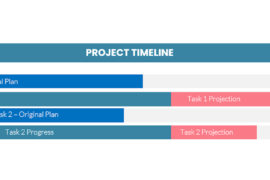 I’ve had the opportunity lately to do some actual in-the-field consulting, something I thoroughly enjoy. This year I’ve been able to work with quite a number of clients on a much broader-based enterprise-wide project management environment.
I’ve had the opportunity lately to do some actual in-the-field consulting, something I thoroughly enjoy. This year I’ve been able to work with quite a number of clients on a much broader-based enterprise-wide project management environment.
It brings me back to my roots but I’ve also come across a phenomena that is very new to me but that I would have never predicted 25 years ago as I was getting into the project management software industry. As we’ve worked on all the aspects of implementing a corporate-wide project management system lately, a surprising obstacle has been the professional-level full-time project planners.
This is a bit of a shock for me since these are the people who I know best. In the early 80’s when companies were moving from mainframe-based project systems down to PC-based systems and companies who could have never afforded a mainframe system were looking at project management software for the first time, full time project managers and project planners were our client. They had the knowledge and skill required to take project data and move it into a project management system. These people were usually co-located in a project management office of some kind. When it came to establishing a corporate process that includes project management, the professional project managers were always involved. They were, after all, the very kind of people who had helped develop standards like the Project Management Institute’s “PM Body of Knowledge” (PMBOK).
So, why on earth would I consider anyone in this category as an obstacle? These are often the same people who are the driving force behind a movement to enterprise-wide project management.
The problem stems from the very thing that makes these people such a key resource – their experience. Professional Planner have, almost by definition, been at this for a long time. They’ve had to invent, establish and maintain project standards even when no one else in the company was interested. When projects had to be managed, these people had to do so centrally. The idea of an enterprise-wide project management system was very attractive to them – almost a holy grail of sorts. The idea was that individuals would be able to access a central system and update it with all manner of data in a variety of categories. Having access to this data in a more timely and (more importantly) easier to gather manner was highly desirable.
Ok, now fast forward to today. Project Management has entered the lexicon of every business school in the world. If you have no understanding of project management as a manager, you’re in big trouble. The old-school planners should be tickled – right? Well, no. They have suffered an increasing irritation of people entering their domain who don’t think of projects the same way. The ERP contingent has been thinking of projects from a primarily corporate financial perspective! The desktop planning contingent (can you spell Microsoft?) have permeated the market with easy to use planning software so easy to get going that anyone who can type with one finger can generate a professional-looking schedule. To these people anything is a project! The IT people have even taken an interest in the subject, daring to think of themselves as project managers. Terrible!
So, now management expresses a desire to move to enterprise-wide project management as a discipline. The old-school professional planners are, of course, included in the conversation because they know more about project management methodology than anyone. I get called because of our long-standing experience with implementing enterprise project management and, guess what? The pro’s are finding themselves not in charge of the implementation but only one of several categories of users in the conversation. They have become the clients rather than the internal consultants.
It’s natural, of course, if you want to work across the entire enterprise, you can no longer think of only the professionals, the one of a thousand people who use project software 8 hours a day. You must think of everyone involved in the project management process. This includes the professionals, of course. But it also includes executives, resource managers, team members, even clients, sponsors, suppliers or anyone else who forms a part of the project. When you really think of the implications of implementing across the entire enterprise, you’ve got to think of everyone.
When you’re implementing coordinated project management across the entire enterprise, everyone involved wants to ensure that they’re particular concerns are met. The team members who might use the system only a few minutes a day want to be sure it’s not a burden and not too complicated. The pro’s want to know they can get access to the data and perform all manners of analysis. The executives want access to better decision-making. Resource managers need to know they can see the load on their people and forecast future requirement adequately. Finally, the IT department (aside from their own project management requests of course) need to make sure that whatever is implemented will not require excessive support or be too much of a burden on the network.
To make this work, virtually everyone will have to compromise a little. Just getting along with everyone else is often a challenge, never mind having to find a common way of working on something as critical as project management. Yes, sadly, that means everyone – including the professional project managers. They may find some of the analysis that was so important to them when they worked alone something that they need to sacrifice. I was debating this with someone recently. “How will the resource algorithm work in this particular tool?” She asked. My response surprised her. “What difference does it make?” I said. “If you can get all the project data into one place, managed by one system, reported on together, you’ll be so far ahead of what you’re doing now that the analysis you’re speaking of will pale in comparison.”
It brings me back to the fundamental challenge in any enterprise project management implementation and that’s compliance. The tools, process, strategy and culture have all got to promote working together or none of the technology will have the chance to make any difference.




